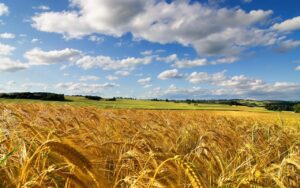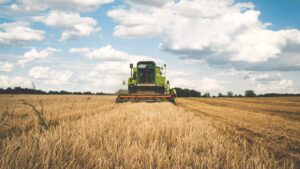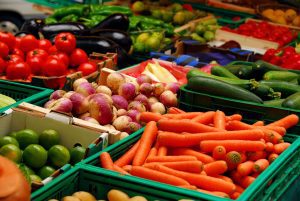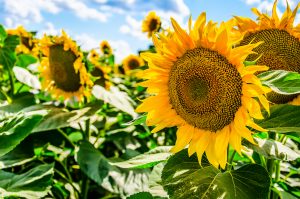
The Ukrainian parliament needs to resolve an issue of uncertainty in biotechnological activities and production of agricultural products containing genetically modified organisms (GMOs) at the legislative level, if the country chooses a course towards the liberalization of such products, the U.S. Department of Agriculture (USDA) is ready to help it.
“This is an initiative of Americans themselves. In Ukraine, there is uncertainty with GMOs and biotechnologies. That is, we have a law, but there are no by-laws, and this, in fact, creates a legal vacuum in this area. On the other hand, we have partially grown GMO crops – soy and rapeseed. So there needs to be some order. It is necessary to say ‘yes’ or ‘no’ to GMOs,” Chair of the Parliamentary Committee on Agrarian and Land Policy Mykola Solsky said in an interview with Interfax-Ukraine.
According to him, the USDA has offered its assistance to Ukraine if the parliament decides to liberalize the issue of GMO production in the country.
“Progress in this direction was planned even before the coronavirus pandemic. Therefore, for three days we arranged a meeting at the USDA with specialists leading all these programs,” Solsky specified the details of the trip of the Ukrainian delegation to the United States at the end of November 2021.
Solsky also said that about 80% of meat in the EU countries is produced from animals raised on GMO-containing feed, while GMO-containing fruits and vegetables are practically non-existent due to lack of demand.
“In Europe, there is no special philosophy about this. Americans do practical things that bring more money. It’s later, if the technology is so cheap that it can be used for eggplants, they will do it too. Therefore, GMO corn and GMO soybeans are the most consumed now – main carbohydrate and main protein, from which its development began. Now they are already working on GMO wheat,” the head of the committee said.
As reported, in August 2021, the Cabinet of Ministers supported the submission to the Verkhovna Rada of a draft law on state regulation of genetic engineering activities and control over the circulation of products with GMOs, this initiative is aimed at conducting a comprehensive review of existing legislation in the field of handling GMO products, and also allows to implement in Ukrainian legislation the normative acts in force in the EU.

Export of Ukrainian agricultural foods to the countries of the European Union in 2021 grew in monetary terms by 33% compared to 2020, to $8.3 billion due to an increase in the supply of agricultural products to foreign markets and its rise in price, according to a posting on the website of the Ukrainian Agribusiness Club (UCAB) on Wednesday.
According to UCAB, the peak months for the export of agricultural products from Ukraine to the EU were December ($1 billion), October ($0.98 billion) and November ($0.97 billion). The lowest export rates were recorded in July ($0.48 billion), April ($0.49 billion) and March ($0.5 billion).
In 2021, nine quotas for duty-free exports to the EU have also been fully used, namely for honey, cereals, flour, starch, processed starch, processed tomatoes, grape and apple juice, chicken eggs, poultry meat (parts), and processed cereal products.
“Compared to 2020, the situation has changed with the use of quotas for the supply of sugar and corn to the EU, or rather with their incomplete use. As for sugar, last year the quota was used by 87% due to a shortage in the domestic market of this product. At the same time, the quota for corn was used by only 5% due to increased demand for this type of grain and the availability of more attractive export channels for Ukrainian farmers,” UCAB said, quoting its analyst Svitlana Lytvyn.
In addition, UCAB said that as of January 18, 2022, Ukraine has fully used the first-quarter quotas for the export of eggs and poultry meat to the EU, as well as the annual quota for the export of honey.
As reported, Ukraine in 2020, within the framework of a free trade area (FTA) agreement with the EU, fully used 11 quotas for duty-free export of agricultural products, while in 2019 there were 12 of them.

President of Ukraine Volodymyr Zelensky has signed a law restoring the value added tax (VAT) rate for part of agricultural products from 14% to 20%, the specified tax rate reduction was in effect from March 1, 2021 to July 30, 2021.
According to data on the website of the Verkhovna Rada, the law on amendments to the Tax Code of Ukraine regarding the rate of value added tax in taxation of transactions for the supply of certain types of agricultural products under No. 1600-IX (bill No. 5425-d) was signed on July 29.
According to the data on the website of the President’s Office, the law is intended to reduce the risks from higher food prices, as well as to create equal conditions for VAT taxation for agricultural producers and processing industry enterprises. The document comes into force on July 30 and applies to tax periods starting from August 2021.
As reported, on July 1, 2021, the parliament returned the VAT rate on livestock products, rye, oats, flax seeds and sugar beets to 20% from the previously reduced one 14%.
The 20% rate will again apply to products with economic activity codes 0102 (live cattle), 0103 (live pigs), 0104 10 (live sheep), 0401 (in terms of whole milk), 1002 (rye), 1004 (oats), 1204 00 (flax seeds), 1207 (seeds and fruits of other oilseeds), 1212 91 (sugar beets).
At the same time, with respect to other grains and oilseeds, the VAT rate is 14%. In particular, the matter concerns goods with codes 1001 (wheat and meslin), 1003 (barley), 1005 (corn), 1201 (soybeans), 1205 (rape seeds) and 1206 00 (sunflower seeds).
Earlier, a number of associations and food industry enterprises asked the president to veto bill No. 3656, adopted by the Verkhovna Rada in December 2020 and reducing the VAT rate on some agricultural raw materials to 14%, since its action entails an increase in the cost of food products by 3-4% and a decrease in the profitability of processing enterprises by 50-70%.

Ukrainian producers since the beginning of the year have received the right to export agricultural products to 11 countries, while for the whole of 2020 Ukraine opened 12 export markets, the State Service on Food Safety and Consumer Protection said on its website.
According to its data, since the beginning of 2021, the markets of Lebanon, Japan, Argentina, Libya and Kuwait opened for Ukrainian producers of milk and dairy products, Serbia for processed animal protein, Ethiopia for table eggs. Lithuania opened a market for the export of arachnids for plant protection needs, a health certificate for the import of live snails for breeding was agreed with Slovakia, and certificates for the export of small ruminants were agreed with Jordan and Kuwait.
The service also announced two audits: an assessment of official control over the production and certification of milk and dairy products and an audit of the state control system for microbiological contamination of non-animal products exported to the EU.
The ministry recalled the coordination of 63 forms of certificates for the export of animal products to the CIS countries in connection with Ukraine’s withdrawal from the previously signed agreement on cooperation in the field of veterinary medicine.
The state consumer service clarified that this year it also has signed an agreement with the Republic of North Macedonia on cooperation in the field of plant quarantine and protection, which should become an additional lever to enhance trade in plant products between Ukraine and North Macedonia.
“Each new market is a new opportunity for Ukrainian business. Today we are actively working with the EU countries, with very promising countries in Asia and Africa. There are about a hundred more export markets that are planned to be opened for Ukrainian producers,” head of the service Vladyslava Mahaletska said.

Ukraine considers Qatar as a promising market for increasing exports of grain, poultry products, vegetable oil, as well as for expanding the range of agricultural products supplied, Head of the Ministry of Economic Development, Trade and Agriculture of Ukraine Ihor Petrashko said, following negotiations with Ambassador of the State of Qatar to Ukraine Hadi Al-Hajri.
“We understand the importance of ensuring food security in the world, therefore, we are interested in stepping up cooperation in this direction. In particular, Ukraine is making every effort to guarantee an uninterrupted supply of food to foreign markets,” Petrashko said.
The Economy Ministry said the Ukrainian agricultural sector is promising for attracting internal and foreign investments, and the mutually beneficial development of investments between Ukraine and Qatar can provide an additional impetus to trade and economic cooperation in this direction.
According to the ministry, in 2020 the trade turnover between Ukraine and Qatar increased by 69.2%, year-over-year, to $139.16 million, while the export of Ukrainian goods increased by 75.7%, to $131.61 million.

KSG Agro agricultural holding in 2020 increased export of agricultural products to African and Asian markets by 46%, to 7,770 tonnes, the holding’s press service has said.
“Last year, we expanded our presence in export African and Asian markets. In the context of the quarantine crisis, the issue of diversifying supplies and expanding the range of products supplied is especially acute,” Serhiy Kasyanov, the head of the board of directors of KSG Agro, said.
According to the agricultural holding, in 2020, the export of wheat flour to Libya increased by 3.6 times compared to 2019, to 3,000 tonnes.
It is clarified that KSG Agro exported 172 tonnes of sugar to Libya, 4,000 tonnes of corn to Malaysia, 600 tonnes of barley to Oman.
KSG Agro is a vertically integrated holding. It is engaged in pig breeding, production, storage, processing and sale of grain and oilseeds.
For the nine months of 2020, the agricultural holding received $ 4.77 million in net profit, which is 52% less than in the same period in 2019, revenue decreased by 17%, to $ 14.67 million.